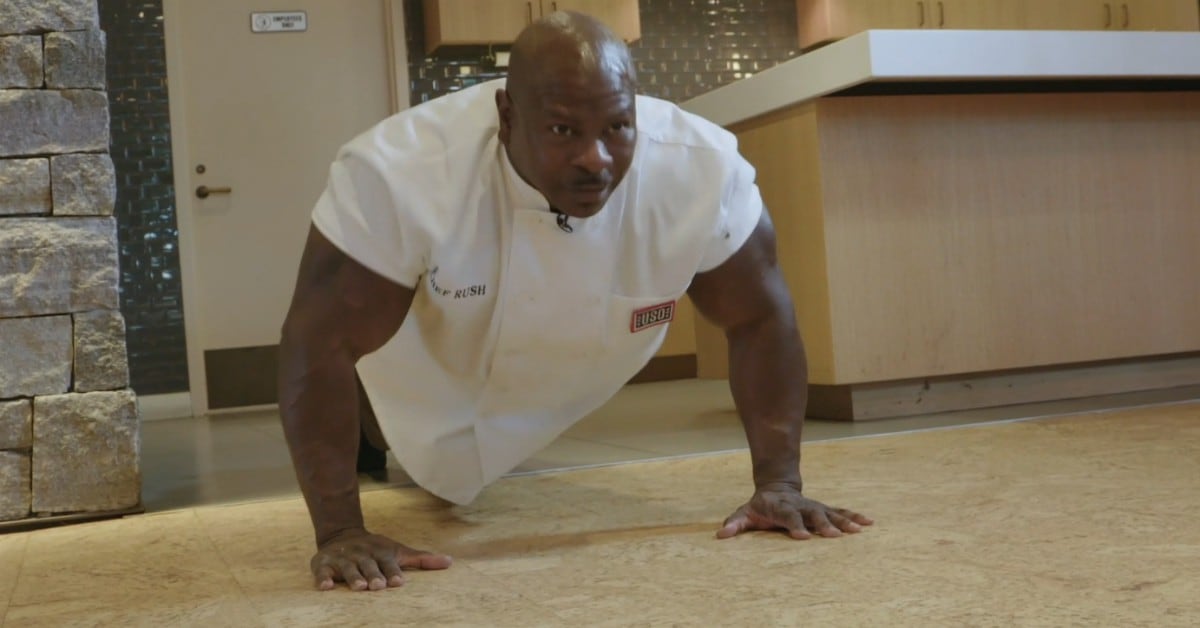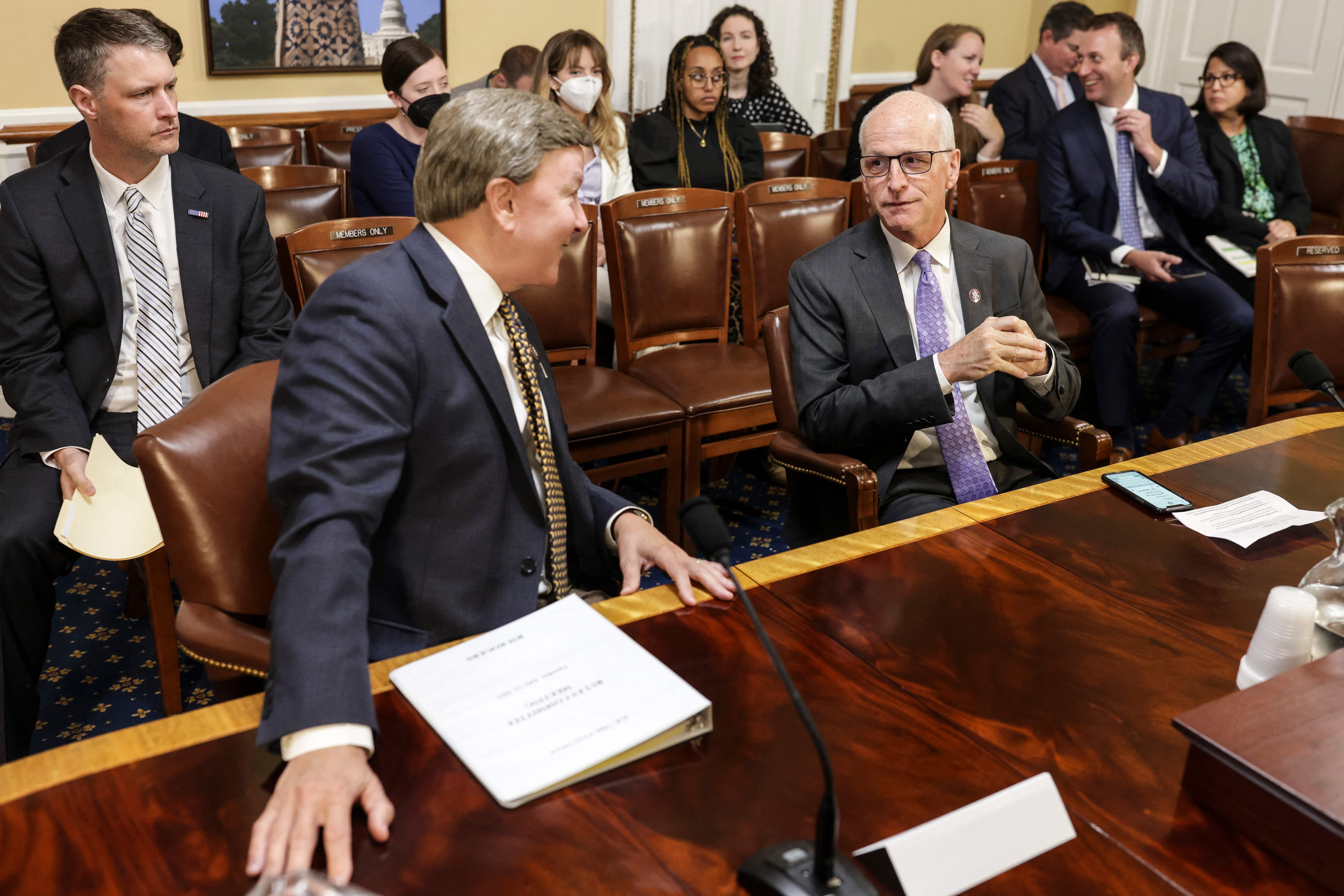Editor’s Note: This story has been updated to correct information about Andre Rush’s military experience. He was not an Army Ranger.
Years of working behind the scenes to feed top military brass, three U.S. presidents and foreign dignitaries including the queen of England have taught chef Andre Rush to live by the old adage, “Be seen and not heard.”
But after a photo of him cooking outside the White House in a chef’s coat rolled up over 24-inch biceps went viral last month, the 45-year-old retired Army master sergeant is having a hard time staying under the radar — maybe for good.
“I get hundreds of emails or texts or pings a day,” he said in a recent interview, hours after receiving a gift from Arnold Schwarzenegger and an invitation to appear on a show with fitness guru Billy Blanks. People want to know what it’s like to cook for President Trump, or Rush’s personal secret to staying so buff. (That’s 25 reps of 315 pounds for each body part and 2,222 push-ups every other day, in case you’re curious.)
He’s a little low on sleep these days trying to respond to everyone. And while that part of his internet fame comes with a lot of responsibility, he said, it’s also “pretty cool.” Rush never expected a big public platform, but one month in, he’s taking advantage of it to advocate for causes he’s been passionate about for years: food, exercise and veterans’ issues.
“It’s like my voice is magnified now to match my body.”
‘Just a cook’
Despite his massive frame, Rush is more foodie than gym junkie. He is a chef, after all.
Rush cooked his first meal at 12 years old — a porterhouse steak with zucchini, squash and potatoes on the side. And when he tasted it, he knew he was in love.
“It was the best steak I’ve ever had in my life because I cooked it,” he said.
He joined the Army at 21 and started his cooking career preparing mass quantities of food at Fort Jackson. Mostly self-taught at that point, Rush remembers hearing comments like, “Oh, you’re just a cook.”
“I hated that terminology,” he said. “I’m like, ‘Oh no, I love that. I wanted to be a cook.’”
North Korea: “we have nuclear weapons”
— Barstool Sports (@barstoolsports) June 7, 2018
White House: “we have Chef Rush”@BarstoolNewsN pic.twitter.com/UQwHtmD89k
That dream took him to the Pentagon to cook for senior staff and later to the White House kitchen, where he still works part-time, cooking for state dinners and other notable events, such as the June 6 dinner that made him famous.
He was in the Army for 23 years and deployed to Iraq before medically retiring in 2016. Rush said that while in service, he was part of convoys that came under fire while traveling through combat zones, among other experiences. He dealt with the raw physical and mental wounds of those experiences the only way he knew how — by cooking.
A way to cope
“I didn’t realize cooking was my therapy until I actually realized cooking was my therapy,” said Rush, whose own separation from the military was aided by his time in a unit at Virginia’s Fort Belvoir for transitioning wounded warriors. “I would just do it on a normal basis, and when I was feeling down or depressed or off my game sometimes, I would just go in the kitchen, pull out stuff and I would just start cooking. I would cook, and I would cook, and I sometimes would make a six-course meal without even realizing it.”
The worst was after Rush lost his mentee, Sgt. Wesley Durden, to suicide, shortly after Rush had trained him to compete on the TLC show “Next Great Baker” in 2011.
Rush remembers getting a call from Durden as he was in the middle of something and ignoring his phone, thinking he’d have a chance to call the younger man back the next day. The next morning he got a 3 a.m. phone call from an old pal he served with in Iraq, who gave him the worst news he could’ve imagined: Durden had killed himself.
“It just tore me apart,” he said, the pain of that moment showing on his face as he talked. “He was a young, spunky kid. He had everything going for him. He had just gotten out of the military. He had just gotten on the show.”
Rush said the hardest part was being able to relate to Durden. Rush blamed himself in part, for putting on a front when he was feeling depressed and going through hard times. He wonders if Durden picked up on that and similarly tried to hide his suffering from others.
“I kind of took it for granted that he was OK, like people took it for granted that I was OK. After that happened, it was hard,” Rush said.
And he often thinks about what would’ve happened if he had answered his phone.
That experience gave Rush a reason to talk more openly about his own feelings of depression and his post-traumatic stress disorder, which led him to start advocating for military transition-related issues.
One way he does this is by taking the #22PushupChallenge every other day to raise awareness of veteran suicide — only he does 2,222 so that it actually counts as a workout.
“The point about them is not to just do them. It’s for a cause, it’s for a reason,” he said. “Each and every time that I do a push-up, I do it for each and every person that I lost, especially Wesley and a few others that pop in my mind and the ones that are continually struggling right now.”
“I hope and pray that they will see what I’m trying to say and even if it’s not me, that someone will say … ‘Get help,’” he continued. “I know it’s hard, but if a person like myself who can bench press 700 pounds and (has) 24-inch biceps can stop and say, ‘Hey, I need help,’ I mean, you can also.”

His story has been motivating for other service members currently in the same transition unit that Rush went through a couple of years ago, said Casey Pizzuto, center manager at USO Warrior and Family Center-Belvoir, where Rush often volunteers in the kitchen.
“To have somebody who’s gone through the treatment and has come out and is doing so well and has used his injuries or what he’s faced and he’s turned it around and achieved — it’s awesome that we’re able to have that connection,” she said. “They can see ... this isn’t going to debilitate me. I’m not going to be stuck in and out of appointments. I have this, and I’m going to overcome it.”
Pizzuto said celebrity hasn’t changed Rush one bit. He’s still just “Chef” or “Rush” to her and as humble as always.
“We’ll just have you come cook a little bit more,” she told him.
Rush also advocates for healthy eating and says there’s nothing more important than what you put in your body. (Yes, the rumors are true. He can eat four whole chickens at once.) Rush is working on a couple of books now — one of which will be a cookbook interspersed with personal stories.
As he navigates the limelight, he wants to inspire others by continuing to be open about his story.
But if you ask him about Trump’s diet, be ready for a challenge.
“If you arm wrestle me, I’ll tell you.”
Spoiler alert: You probably won’t win.
Military Times contributor and former reporter Natalie Gross hosts the Spouse Angle podcast. She grew up in a military family and has a master's degree in journalism from Georgetown University.




